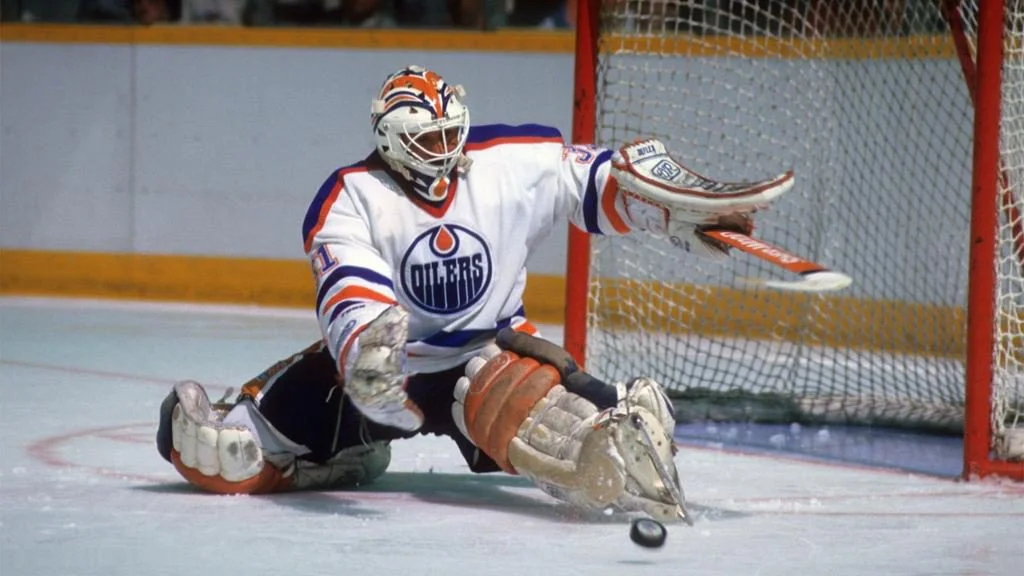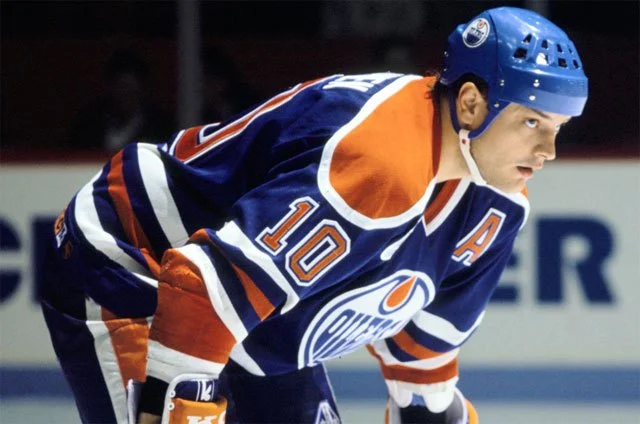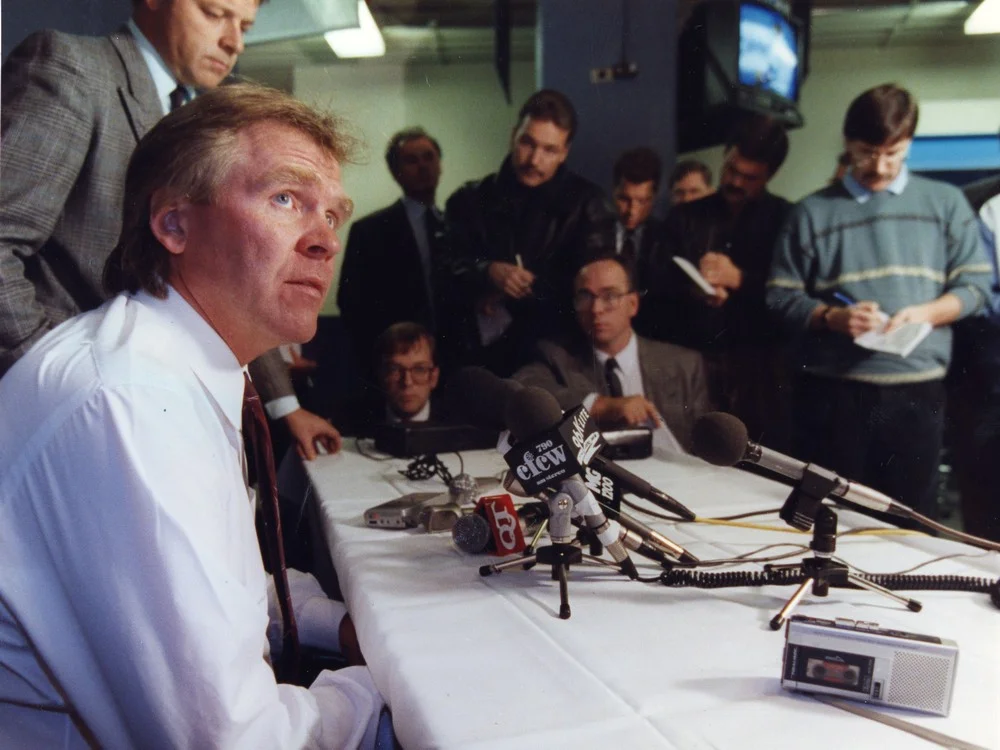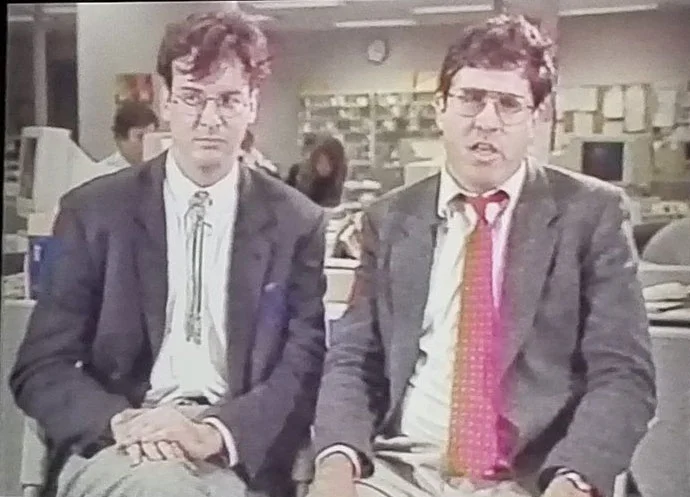
The Grant Fuhr Story
Like many journalistic investigations it began with a tip. Edmonton Oiler star goaltender Grant Fuhr apparently has a long-term serious cocaine problem, I was told. The Hall of Famer had also spent some time in a drug treatment centre recently and his frustrated ex-wife may be willing to talk about it, the person added. My source was impeccable, but second hand, so there was a lot of work to be done to confirm or disconfirm the story because in Canada, if you can’t prove it, you can’t print it. More than 28 years later I still can’t reveal who tipped me off, or who my source’s source was.
I am writing this post in part to take readers inside that investigation and depict some of the most colourful events that occurred, but have either never been reported, or only vaguely referred to. These include a dramatic confrontation with Oiler GM Glen Sather in his office, followed by a thrilling final showdown in a boardroom at the Edmonton Journal a few hours later, as the Oilers organization fought hard to suppress the story the night before it was to be published. I will also write about an extraordinary coincidence without which the Fuhr story might never have been published. Watching Don Metz’s recent documentary Making Coco, The Grant Fuhr Story, I thought it was time to tell the behind-the-scenes story of the Journal’s investigation. Finally, I am writing this to address persistent false claims that Corrine Fuhr, Grant’s ex-wife, was a bitter woman who only talked to us to get back at her ex-husband, which I totally reject. How they could make those claims without even speaking to her and spending time with her, as we did, is beyond me. There is a difference between journalism and gossip. I was sad to discover while researching this post that Corrine, who made a second happy marriage, died somewhat suddenly after an illness about 15 months ago.

It was the summer of 1990. I had been a reporter at the Edmonton Journal for just over a decade and had developed two specialties – criminal justice reporting and investigations. After hearing the tip I went to my desk in the newsroom next to friend and fellow reporter, David Staples, and discussed it with him. David immediately said he would like to work on the story and from then on we were a team. Ironically, we were also the biggest Oiler fans in the building and great admirers of Fuhr, but a potential story this big could not be ignored. We both remembered well the 1986 Sports Illustrated article that claimed five unnamed Oiler players had cocaine problems. I have always been a fan of the magazine but If you can’t or don’t name names you unfairly cast a shadow over all the Oiler players and it suggests you don’t have enough evidence to publish the full story. Not everyone in Journal management thought we had a chance of getting the Fuhr story in print. One manager told us flat out that there was no way we would ever find enough evidence to get the story published. David and I countered that if Corrine Fuhr was willing to talk with us on-the-record about her ex-husband’s drug use, and if we could establish that Grant Fuhr had spent time in a drug treatment centre over his cocaine addiction, there was surely a story that could be written. For the time being we got the go ahead.
The first person we talked to was Fuhr’s agent and lawyer, Ritch Winter, whom we met in his office. He taped our conversation for his own protection, repeatedly saying he couldn’t answer almost any of our questions, citing attorney/client privilege, but he did not discourage us. When we asked him if he thought Corrine Fuhr would talk to us he said she might.
David and I decided to call Corrine and try to arrange for a meeting at her house, which she agreed to. Such meetings are oftentimes initially uncomfortable as both parties size up the other’s credibility, character and intentions, and this was no exception. We needed to convince her that we knew what we were doing and could be trusted, and she needed to convince us that her story was credible and that she was not just an angry ex-wife. Corinne agreed to talk openly to us on the condition that for the time being her comments would be off-the-record, and would stay that way until and unless she was convinced that our story would make things better for her, her daughters and her ex-husband.
Corrine expressed concern for Grant Fuhr’s health but said her main objective was to get him to clean up his act and be a good, reliable father to their two daughters. She then told us the story of their relationship, beginning with the claim that Grant was snorting cocaine the night they met in a nightclub in 1983. She told us about drug dealers with names like Gypsy, Sparky, and Johnny B that would phone the house demanding money they claimed Grant owed them and of finding cocaine stashed around their home, which she flushed down the toilet. I asked her about a strange incident in 1988 when Grant missed the team plane to Calgary, but flew down later before the game with the Calgary Flames. She said her husband was dropped off on the front lawn that morning by some of his drug buddies after a night of cocaine use. Corrine said she contacted Winter and he called Sather, who was then still the Oilers head coach. Sather told them to put Fuhr on a plane and understandably gave him hell when he finally arrived, she added. Grant dressed for the game as the back-up goalie to Bill Ranford, but did not play.
Crucially, Corrine told us that one day a few years earlier Grant came home and told her that he had been called into Sather’s office, where the Staff Sgt of Drugs for Edmonton City Police played a tape of him calling a known drug dealer and trying to buy some cocaine. The police had convinced a judge to approve a wiretap on the dealer and up popped Grant Fuhr’s call. He came home badly shaken, she said, noting that Sather had roughly called him out. We immediately realized how important this incident was, as it could establish both Grant’s cocaine use and Sather’s knowledge of it, but we also knew we needed more concrete evidence of the incident.
I didn’t know the city police Staff Sgt in charge of drug investigations, making it unlikely that I would get some help there, but I had come to know Rick Jordan, the Edmonton RCMP Staff Sgt of their drug section while covering some of the big cases his officers had been involved in at the federal court. Jordan was a very tall, broad-shouldered man who reminded me of John Wayne. He had a great sense of humour and I had talked to him on numerous occasions about drug cases and both liked and respected him. I figured that even though it was a city police matter Rick would likely know about it. I called him on the phone and he broke out laughing when I asked him if he had ever heard the story. “That wasn’t the city police,” he exclaimed with a loud chuckle, “that was me.” Rick explained that he had an understanding with Sather that if he stumbled on evidence of any Oiler players fooling around with drugs he would tell him. He described the meeting in Sather’s office to me in detail, saying it was a very rough experience for Fuhr. Corrine’s comments about the incident and Jordan’s first-hand account of it clearly established that the goalie had a drug problem and Sather knew about it. Now we were really getting somewhere.
David and I set up another meeting with Corrine and we drove to her place, only to find nobody home. We were puzzled and worried and decided to wait a while to see if she showed up, but there was still no sign of her. Could she have gotten cold feet? We would never have enough information to run the story without her comments, which were still off-the-record. David suggested we get back on the road and look for a nearby coffee shop where we could get something to eat while we came up with a plan before returning to her house. We drove for quite a distance without seeing any place that was appropriate and finally settled on a Boston Pizza outlet. A few minutes later David told me to look across the room and miracle of miracles there sat Corinne Fuhr with a couple of female friends! I don’t know what the odds were that we would all end up there at the same time, but maybe it was meant to be. We didn’t know if she had spotted us yet, but we decided to walk over and say hello. Corrine smiled at us and said she would join us in a little while.
She quickly confessed that she had purposely avoided us and not been home at the agreed time but said we should all go to her place now and she would give us some conditions that must be met if she was going to go on-the-record. I will always wonder if the whole story might have collapsed if we hadn’t met Corrine by chance at that Boston Pizza. At her house she presented her plans and demands. She said she wanted us to get a friend of Grant’s who was not a hockey player to say the goalie needed help with his cocaine problem. Secondly, we had to find an Oiler teammate who would comment on Fuhr’s coke problems and encourage him to get help. That sounded impossible at first, but she said she had some names for us. Her sister’s boyfriend, Dave Eckert, would talk to us about Grant’s drug use, which he had witnessed, and encourage him to go into treatment again until he shook his addiction. Corrine said her husband was a binge user, who could give up the drug for a while but would then go on a run of using it. The player she suggested was the Oiler’s feisty Finnish forward, Esa Tikkanen, whose wife Lotta was a close friend of Corrine’s. Tikkanen had seen a drug dealer throw a packet of cocaine to Fuhr while sitting with him at the Forum Inn, across from the Oilers hockey rink, the Coliseum. Tikkanen had told his wife about the incident and said Fuhr admitted his drug use.

I drew the call to Eckert, which was fairly easy, and David drew the really hard one, Tikkanen, as it would be asking a lot to get a hockey player to talk about a teammate’s drug problem. It was a tough task, but Corinne would not go on-the-record without it, emphasizing there was no point for her to get the story in the newspaper if Grant wasn’t pushed hard to give up cocaine and change his life. I was excited a few days later when David told me he had contacted Tikkanen by phone in Sweden and gotten his confirmation of the incident in the Forum Inn. Without it, there would have been no story. To make that kind of call successfully requires a lot of planning on how to broach the subject and David obviously handled it very well. All that was left now was to confront Fuhr and Sather and those encounters would have to be face-to-face.
For the first time in Oilers history the team held their training camp in Europe in 1990. They were scheduled to leave on the morning of August 31, so many of the players, including Fuhr, weren’t coming back to Edmonton until Thursday, August 30, which was shaping up to be a wild and unforgettable day. The plan was for David to meet and talk to Fuhr when his plane arrived and for me to interview Sather in his office, a daunting prospect to be sure. Thanks to weeks of nosing around for clues, we were sure that they both knew that we were onto the story, so I expected some fireworks. We talked to the great Journal sports columnist, Cam Cole, for my money the best sportswriter in the country, so that the paper would have eloquent and insightful columns and boy did he deliver. As former Journal Editor-in-Chief Steve Hume once told me, unlike other sports columnists Cam didn’t just write from the perspective of sports, he wrote from the perspective of life. We told Cam everything we knew and he set up the meeting with Sather at the Coliseum for late in the afternoon.
David was at Edmonton International Airport when Fuhr arrived and followed him through the airport asking tough questions. When Fuhr got into a car with a friend, David hopped in and kept pressing him for answers. Probably any other player would have kicked David’s ass out of the car, but Grant was such a nice person that he just couldn’t do that. So the friend drove on while the interview continued. I still chuckle when I think of that ride. Great work by David.
Cam and I arrived at the Coliseum and made our way to Sather’s office. He was now the President and General Manager of the Oilers club with John Muckler as head coach. I have covered politics, where interviews are usually easily obtained because even though the politicians may not like us, they know they need us. For many years I specialized in the justice system, which was tougher, especially visiting psychopathic maximum security prisoners like multiple murderer Daniel Gingras, or Larry Takahashi, the notorious Balaclava Rapist, or the odd ornery cop, but I did not find those encounters too intimidating or frightening. Sports is another world altogether. Many athletes are used to settling their disputes physically, and I have always admired the sports reporters and columnists who sometimes write negatively about a player, coach or manager and then have the jam to go into the locker room the next day and face that person. It takes real courage and I got my one big taste of it that day. When you are dealing with someone like Glen Sather, who is razor sharp, fiercely protective of his team and even physically menacing when he wants to be, that is a real test.
Sather showed Cam respect but he began by staring me down and mostly insisting everything I was saying was wrong. He initially denied knowledge of the incident where Fuhr missed the plane to Calgary, but I noted that there had been a brief story about it in the Journal and Oilers PR man Bill Tuele, the only other person in Sather’s office, reminded his boss of that event. As if he didn’t know. Things got really heated when I raised the subject of the confrontation in Sather’s office where the tape of Fuhr trying to buy cocaine from a well-known drug dealer was played. Glen flat out denied it and sounded angrier with every second, but I kept on describing what happened that day, knowing I was right. I suspect he thought I only knew about Corrine’s second-hand account of the event, so may have believed he could bluff me. He obviously didn’t know I had heard the complete story from Rick Jordan, and although Rick didn’t say it was off-the-record I felt I could not tell Sather about it without his permission, so I never mentioned him. As I kept insisting the meeting had happened Glen was sitting at his desk chewing hard on an unlit cigar and getting really mad – or possibly pretending to be. Suddenly he stood up, towered over me and said loudly and aggressively, “Are you calling me a fucking liar?” This was the moment of truth. I hesitated for a second, a bit shaken, and then replied as calmly as I could, “No, I’m not calling you a liar. We will print your denials, but we will also give our account of the meeting.” Sather hesitated for a second, possibly thrown by the fact that I denied I was calling him a liar, but that the rest of my reply suggested he wasn’t telling the truth. Or maybe he was wondering if I knew more about the meeting than he initially thought.

There were a few moments of silence before Sather told Cam and I to go into a nearby room, saying he wanted to talk to his lawyer before continuing. As soon as we were in the room Cam said nervously, “Are you absolutely sure that’s what happened?” I was a little rattled – who wouldn’t be? – but I told Cam not to worry. There was no doubt about the basic facts. Sather was a very formidable person. If I wasn’t fortunate enough to know the full truth he might have intimidated me into backing down. He was ten times scarier than any cop I had ever been confronted by, but I knew I was holding the better hand this time. Thanks to Rick Jordan.
A few minutes later Sather opened the door, invited us back into his office and said something like, “I just got off the phone with Rick Jordan of the RCMP and now I remember, you’re right, there was a meeting.” I exhaled deeply and we continued with the interview. Now he knew that I knew and the rest didn’t matter that much as Fuhr’s ordeal in Sather’s office with Rick Jordan present was a story clincher. Cam, who taped the conversation, asked a series of insightful questions as Sather explained what a challenge it was for him to keep his young stars out of trouble. He talked freely about the day Fuhr missed the plane to Calgary. “What are you doing?” he said he asked his star goalie. “Are you hooked on this stuff?” I did not and do not resent Sather’s aggressive response to my initial inquiries. For the past few years he had been fighting a battle to keep his fun-loving young stars on the straight and narrow and he knew that Fuhr would be suspended if the story came out. The great Oiler teams of the 1980s were his legacy and he protected the players like a fierce mother bear.
Cam and I hurried back to the Journal building and conferred with David Staples and the Journal’s Managing Editor Murdoch Davis. It seemed certain our stories would run the next day and David and I began writing them. Sometime later Murdoch told us that Sather had called him a couple of times trying to get us to kill the story. I can’t remember all the offers Sather made, but one was that he would have every Oiler player take daily drug tests and share the results with us. He did everything he could to convince us not to run the story. Murdoch told us that Sather had invited us all to come to his office so we could discuss the matter. I questioned why we should go to his office at the Coliseum. Why don’t we tell him to come to our office if he wants to talk, I said. Everyone agreed and Murdoch called Sather and made the arrangements. I couldn’t help but think this was the most dramatic day of my career. I knew this was not the most important story I ever worked on, but it was certainly the biggest one.
Less than an hour later Sather, Fuhr, Tuele and Grant’s new lawyer walked into the Journal boardroom. Murdoch Davis, Journal Editor-in-Chief Linda Hughes, Cam, David and I were waiting. Sather had that famous cocky look on his face as he strolled in. That made me think he likely had a final card up his sleeve. He was no quitter. Early in the discussions Fuhr’s lawyer asked us if Ritch Winter had given us our information. “No, he told us he couldn’t talk to us about it because of lawyer/client privilege,” I replied. “Good for Ritch,” the lawyer responded, looking a little disappointed. A little later Sather played his hole card. He said he had talked to Esa Tikkanen on his cell phone on the way to our office and that the Finn had denied saying the things David was claiming he had said. An uncomfortable moment passed and then David replied firmly, “I taped the conversation Glen.” It was like an elephant dropped from the ceiling and landed on the boardroom table. Ba ba boom. There was a long silence and then Sather glumly said he would have to leave the room to call NHL Commissioner John Ziegler and tell him the story was coming out the next day.
Shortly afterwards Sather and his party left and David and I were told that we had to finish our stories for the first edition, the morning paper. I don’t recall anyone saying it out loud, but I figured the Journal’s top editors were rightly worried that if we waited a day Sather might leak a watered down version of the story to a friendlier media outlet. It was the only time I can recall in my three decades as a Journal reporter where they actually held the presses until we were finished and the copy editors had handled it, including the managing editor. As I wrote the story I got a call from a laughing Rick Jordan, who said he was having a great time. He described how Sather called him earlier that evening and how he told him that I knew everything about the meeting with Fuhr. I talked to Rick a number of times after that and saw him in the courthouse occasionally and was shocked and saddened to hear of his death a few years later.
A few hours later the stories were done and the paper went to press. About 30 of us, the whole night crew, including senior managers, reporters, and copy deskers went across the street afterwards to a pizza joint that closed the doors, pulled down the shades and served us food and drink for hours. The hell with Edmonton’s liquor laws. Eventually the first papers off the presses were delivered to us and everyone pored over the stories. I remember David telling me that we should fully appreciate this moment as we would likely never have a night like this again. He was right. But to tell the truth I felt a little sorry for Grant Fuhr and I think David did too. Grant was a great goalie and he was clearly a very nice guy with some problems, which is far from unusual. He needed help and support, not a suspension. Unfortunately, the NHL in those days was a prehistoric institution.
The story landed like a bomb on many Edmonton readers. The local radio stations pumped the story hard the next morning and reported that many people were looking up and down the street for the delivery of their copy of the Edmonton Journal to read the full story, including Cam Cole’s terrific column. The Edmonton Sun, our rivals, which claimed to have the better sports section, got massacred. Worst of all, the story came out on a Friday and they not only didn’t have it, they didn’t even have a Saturday paper to follow it in those days. Some Sun staffers I knew thought we purposely released the story on a Friday to screw them over, but we were just lucky that the story broke when it did. We couldn’t run it until we’d talked to Fuhr, or he refused to talk to us, and he didn’t get back to Edmonton until Thursday. We also had to talk to Sather. So we had an extra day of complete control of the story and David and I had lots of information and wrote more stories about it. Cam Cole crafted another great column and three other reporters wrote stories as well. We had every angle covered. There wasn’t much left to write by Sunday. In addition, the entire Oiler team, minus Fuhr, flew to Europe early Friday morning, with only one Sun reporter on the plane to try and get some stories for Sunday. Friends of mine at the Sun have called it the worst day in the paper’s history. The Sun had some very good reporters and very nice people whom I liked and whose work I respected, but this was a body blow, especially for their sports department.
David and I were disappointed, but not surprised when the NHL suspended Fuhr for a year because of his cocaine use and spoke out against it in an interview we did with a local TV station. League officials were more concerned about the reputation of the league than in helping a star player to recover from his drug problems. Happily the NHL brass finally came to their senses years later and now support players who seek help. Fuhr’s suspension was reduced to 59 games, and he was able to return for the final 23.

Grant Fuhr was a great goaltender and a quiet guy whose teammates liked him very much. Like many young people he got involved with illicit drugs and his club and league officials let him down. Over the next few years David and I occasionally talked about our mixed feelings about the story. It was a monster scoop but we both felt bad about the suspension. Then Grant happened to run into David Staples one day and they had a conversation, which David wrote a story about in the Journal. Fuhr said he had nothing against us and suggested the stories helped push him to get his life together and find greater happiness, which shows you the kind of man he is. I was so glad to hear that both for Grant’s sake and for ours.